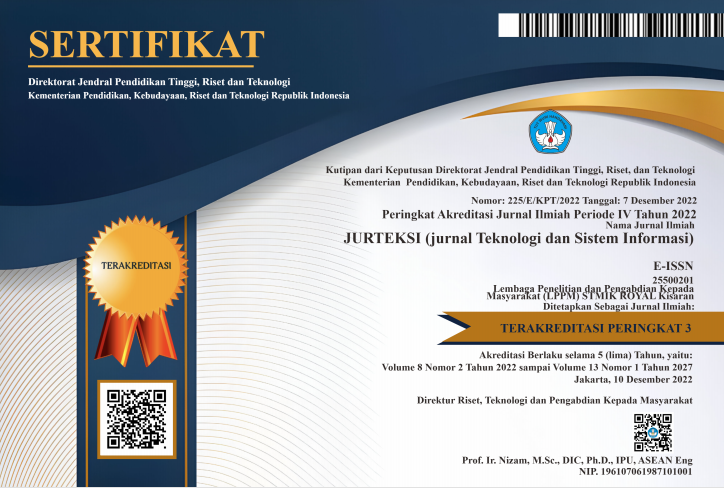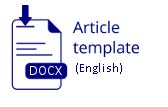ANALISIS SENTIMEN PADA PEMERINTAHAN TERPILIH PADA PILPRES 2019 DITWITTER MENGGUNAKAN ALGORITME NAÃVEBAYES
Abstract
Abstract: The Presidential general election on 2019 became one of the most popular topics on twitter nowdays. The society give their opinion about the pair of candidates that they are support through the social media. This research was predicts about the society sentimens toward the candidates of President and Vice President of Republic of Indonesia. The data was used based on the tweet on the @jokowi twitter account. The retrieval of data by using the Tweepy library with the Python 2.7 programming language. This research was classified became of two of society sentiments classes, namely positive and negative. The modeling was used of the weighting method Unigram, Bigram, Trigram, N-Gram (1-2) and N-Gram (1-3) that used the Naïve Bayes Algorithm on the Weka Application. The modeling data was used by the dataset of 646 sentences. The highest results of this reseach were obtained by Unigram Weighting, namely: 81.4% accuracy, 81.5% precision, 81.3% recall with a time of 0.3 s.
Keywords: classification, naïve bayes, 2019 presidential election, twitter, unigram
Abstrak: Pemilihan Umum tentang Pilpres 2019 menjadi salah satu topik yang ramai diperbincangkan di Twitter. Adu pendapat di sosial media oleh masyarakat mengandung opini terhadap pasangan calon yang didukungnya. Penelitian ini memprediksi sentimen masyarakat kepada pasangan calon Presiden dan Wakil Presiden Republik Indonesia. Data yang digunakan adalah tweet yang ada pada akun Twitter @jokowi. Pengambilan data menggunakan library Tweepy dengan bahasa pemrograman Python 2.7. Penelitian ini mengklasifikasi sentimen masyarakat menjadi 2 kelas, yaitu positif dan negatif. Kemudian dilakukan pemodelan dengan metode pembobotan Unigram, Bigram, Trigram, N-Gram (1-2) Dan N-Gram (1-3) menggunakan Algoritme Naïve Bayes pada Aplikasi Weka. Pembuatan model menggunakan dataset yang berjumlah 646 kalimat. Hasil tertinggi yang diperoleh pada penelitian ini adalah dengan menggunakan Pembobotan Unigram, yaitu : akurasi 81,4%, presisi 81,5 % , recall 81,3 % dengan catatan waktu 0,3s.
Kata kunci: klasifikasi, naïve bayes, pilpres 2019, twitter, unigram.
References
& S. J. Feldman, R, Text Minning Handbook : Advanced Approaches in Analyzing Unstructure Data. New York: Cambridge University Press., 2007.
M. A. Razzaq, A. M. Qamar, and Hafiz Syed Muhammad Bilal, “Prediction and analysis of Pakistan election 2013 based on sentiment analysis,†in 2014 IEEE/ACM International Conference on Advances in Social Networks Analysis and Mining (ASONAM 2014), Aug. 2014, pp. 700–703, doi: 10.1109/ASONAM.2014.6921662.
G. A. Buntoro, T. B. Adji, and A. E. Purnamasari, “Sentiment Analysis Twitter dengan Kombinasi Lexion Based dan Double Propagation,†CITEE, pp. 39–42, 2014.
M. H. Rasyadi, “Analisis Sentimen Pada Twitter Menggunakan Metode Naïve Bayes(Studi Kasus Pemilihan Gubernur DKI Jakarta 2017),†2017.
F. Nausheen and S. H. Begum, “Sentiment analysis to predict election results using Python,†in 2018 2nd International Conference on Inventive Systems and Control (ICISC), Jan. 2018, pp. 1259–1262, doi: 10.1109/ICISC.2018.8399007.
F. . Tala, “A Study of Stemming Effects on Information Retrieval in Bahasa Indonesia,†Inst. Log Lang. Comput. Univ. Van Amst. Neth., 2003.
F. . Wenando, T. B. Adji, and Ardiyanto, “Text Classification to Detect Student Level of Understanding in Prior Knowledge Activation Process,†Adv. Sci. Lett., vol. 23, no. 3, pp. 2285–2287, 2017.
F. . Wenando and E. Fuad, “Detection of Hate Speech in Indonesian Language on Twitter Using Machine Learning Algorithm,†Pros. CELSciTech, vol. 4, pp. 6–8, 2019.
S. S. Aksenova, Mechine Learning with WEKA – WEKA Tutorial –Explore Tutorial for WEKA Version 3.4.3. California, 2004.
K. D. A, Normah, and U. A. H, “Prediction of Indonesia Presidential Election Results for the 2019-2024 Period Using Twitter Sentiment Analysis,†2019 5th Int. Conf. New Media Stud., pp. 36–42, 2019.













